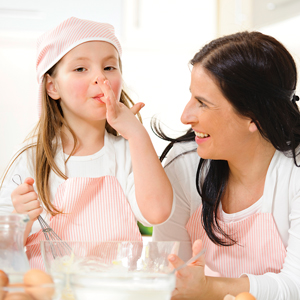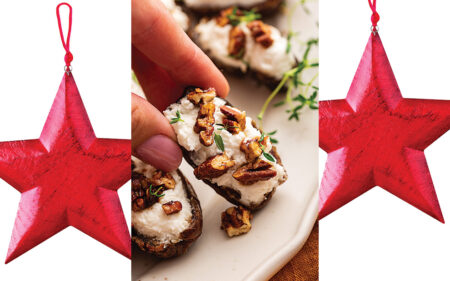Theodora von Hohenstaufen Noll is the first to admit that she had a tendency to hover over her children. Letting them loose in the kitchen, where sharp knives and hot burners could threaten their safety, was obviously out of the question.
I was always very much a helicopter parent,” she said. “I had been viewing them as little kids incapable of taking care of themselves.”
The loosening of the apron strings came two years ago, when Nik and his twin brother, Karl, went on a Boy Scouts camping trip. Nik came home fired up to cook. He started out small, making French toast, then worked his way up to London broil and homemade mashed potatoes.
“It’s very satisfying that we are sitting down to eat something that I created,” said Nik, 14. “A lot of teens know everything about video games and mechanics, but a lot don’t know how to cook.”
These days, it’s vital that they do.
“Parents should get their children involved in cooking at an early age,” said Patty LaFratta, a Henrico County mother of three and a pediatric dietician. “That way, they get a better understanding of nutrition and why our bodies need the types of foods they need.”
According to the Centers for Disease Control and Prevention, childhood obesity has more than doubled in children and tripled in adolescents in the past thirty Years. At the start of the decade, more than one third of children and adolescents were overweight or obese.
By teaching children how to cook wholesome meals and avoid processed and prepared foods, they will be equipped to make smart choices in school cafeteria lines and when they are socializing with friends.
But cooking at home is about more than just good nutrition.
“For so many families, this might be one of the few times they can have that kind of unstructured conversation,” LaFratta said. “Cooking is very much a social thing. What a great way for parents to bond with their children.”
LaFratta says the key to getting children excited about cooking is taking baby steps in the kitchen. As soon as they are old enough to stand on a stool, they are ready to help mix dry ingredients, crack eggs, or stir cookie dough. Gradually give them more responsibility, from preparing A salad and a side dish to making pizza or roasted chicken.
“Once kids become teenagers, it’s important they have the know-how to make their own lunches and help their parents make dinner,” said Christine Wansleben, owner of Mise En Place Culinary Center in Shockoe Slip, and mother of young twins. “With both parents working, it’s important that kids can help out. It’s become a necessity that they know how to cook and not just get in the habit of opening a pre-packaged meal.”
To keep it fun, some families hold competitions based on television shows like “Chopped” or “Iron Chef” from the Food Network. At the Ramkey household in the West End, for example, Jimmy, 17, Nicole, 14, and Katie, 13, often duel it out on leftover night.
“One time, they had leftover chicken breasts,” said their mom, Marie, a full-time accountant. “They came up with spiced, marinated, and grilled. It was great to come home from a busy day at work to find dinner on the table.”
Sometimes, cooking may seem like a chore to children. But more often than not, it’s a way to build lasting memories.
“My grandmother in New Jersey is a big cook,” ninth-grader Nicole said. “She likes To make homemade pasta, and together we roll out the dough. When I think of cooking, I think of spending good times with my grandmother.”
Cooking is becoming so popular with youngsters that Young Chefs Academy, a cooking school in Henrico County’s far West End, started a cooking class just for teenagers. The weekly class covers everything from simple, healthy dishes to gourmet masterpieces.
“Even if they don’t want to grow up to become master chefs, it’s so important for kids to learn how to cook,” said Kristen Braia, owner of Young Chefs. “I think in our busy lives, we’ve pulled away from cooking at home. We need to get back to that.”
Cooking at home is not only more healthful, but more economical.
“There’s too much reliance on fast food these days,” said Heidi Jadlowski, the mother of two. “That not only gets expensive, but it’s not good for you. I want my kids to be self-sufficient.”
Neighborhood children often visit the Jadlowski house to help Heidi bake cookies or muffins on Saturday morning. It’s time she savors.
“They are so excited to take some home with them and show off their creations,” she said. “They are so proud.”
Jadlowski is teaching her 12-year-old daughter, Sarah, how to make homemade spaghetti sauce.
“I cherish passing on family recipes,” Jadlowski said. “There’s just something about a homemade meal that makes you want to sit around the table. It’s special.”
And when children help their parents cook or prepare a meal on their own, they are more eager to try new things and experiment with foods from around the world.
“By experimenting with foods from different cultures, it exposes them to so much more than just food,” Wansleben said. “Cooking even helps children brush up on their math skills because they are measuring and using fractions.”
Many parents enjoy taking their children to the grocery store, so that meal planning can become a family affair. Theodora, the helicopter parent who’s changing her ways, says her teenaged son Nik often cooks with foods from a local farmer’s market.
“He’s happiest in the kitchen when I let him loose to experiment,” his mom said. “When he’s older, he will have the skills in the kitchen to impress the girls! It’s so important that kids develop these life skills and not depend on eating out of a box.”
Nik began taking cooking classes at Young Chefs about a year ago and sometimes envisions himself as a professional chef.
“I love making homemade macaroni and cheese,” Nik said. “It’s so much better than buying the stuff that’s already prepared. I never realized how much better it could be or how much fun you could have making it.”
That’s not to say Nik hasn’t had his share of disasters in the kitchen. Never, he said, should one attempt to cook bacon in the oven.
“It smoked a lot!” he admitted. “But you don’t learn if you don’t try.”
Children and cooking go hand-in-hand with messes. Young children and teens don’t always clean up after themselves, so LaFratta encourages patience.
“Expect the mess and be okay with that,” she said. “Hopefully by the time they are teenagers, the mess is not as big.”
Parents should always stress safety in the kitchen, especially when dealing with knives, the hot stove surface, and the oven.
“When they learn these things at an early age, it becomes second nature to them,” she said. “It’s all part of becoming independent.”
For decades, the kitchen has been the place families gather. No matter how small the space may be, friends and relatives crowd together to talk, sample dishes, and offer their own suggestions for improving a recipe.
“There’s a sense of belonging here,” Jadlowski said. “You are not only making food, you are making memories.”







